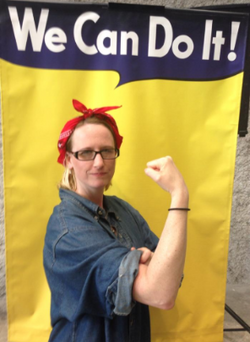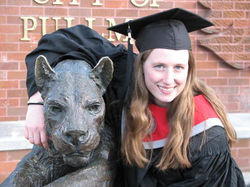ABOUT ME

My name is Kristina Young. I’ve been working in the aerospace industry since 2008, gaining extensive knowledge and expertise in aircraft manufacturing, fabrication, and engineering. My career at The Boeing Company has allowed me to support both commercial and military airplane programs, where I discovered my true calling managing instructional design projects.
In my leadership roles overseeing apprenticeship programs, new hire training and onboarding, and academic pipeline development, I focus on educating the next generation of skilled manufacturers. My expertise in adult education and training encompasses:
Adult Education and Training Experience:
-
Adult Teaching and Learning
-
Multicultural and Experiential Education
-
Facilitation Processes and Methods
-
Instructional Design
-
Learning Research and Analysis
-
Assessments and Evaluations
-
Philosophy/Organization of Workforce Development
VIDEO: My Masters Program Reflection
Along with these skills, I also educate both adults and young adults on manufacturing and fabrication career pathways, resume building, and interview techniques.
I partner with high school and community/technical college programs throughout various states in the U.S.A, communicating Aerospace Manufacturing and Fabrication critical skill needs and skill requirements with both students, educators, and school administrators. I was involved in the development and implementation of the Core Plus Aerospace curriculum, currently implemented at over 50 schools throughout Washington state, to help prepare students for careers in Aerospace Manufacturing. Plus, I oversee the continuous development and sustainment of high school's utilizing the curriculum in their Career and Technical Education (CTE) programs.
(Core Plus Aerospace, n.d.)
(Core Plus Aerospace, n.d.)
Although, I'd say my greatest passion lies in mentoring and training in which I have over 25 years of experience in public speaking and facilitating learning. My passion first started in my teen years where I earned an Instructors Certification to teach Tae Kwon Do to both adults and children. Through years of self-discovery in identifying the joys of mentoring and training, I realized I wanted to learn how to best facilitate adult learners, which led to my goal of achieving a Master's of Education degree in Adult Education and Training through Colorado State University.
My hope is to continue in my adult education journey by utilizing the knowledge and skills I gain as a lifelong learner and continue to drive change in the way we facilitate adult learning in the aerospace manufacturing industry.
Click on the photos below to learn more about me!
 |  |  |
|---|---|---|
 |  |  |
 |  |  |
 |  |  |
 |  |  |
 |  |  |
 |  |  |
 |  |  |
 |  |  |
 |  |  |
ADDITIONAL RESOURCES AND REFERENCES:
-
Kirkpatrick Partners. (n.d.). Training events. Retrieved November 15, 2024, from https://www.kirkpatrickpartners.com/training-events/
-
Core Plus Aerospace. (n.d.). Core plus aerospace. Retrieved November 15, 2024, from https://coreplusaerospace.org/
WHAT IS A TEACHING PHILOSOPHY AND WHY IS IT IMPORTANT?
A teaching philosophy encompasses the values and beliefs that affect the way a facilitator approaches adult learning.
Understanding one’s teaching philosophy is vital to conducting successful adult training. There must be a clear understanding of one’s values, beliefs, and attitudes to ensure an organized vision, while providing direction, stability, and understanding of why we teach the way we do (Galbraith, 2000).
WHAT IS MY TEACHING PHILOSOPHY?
My teaching philosophy revolves around three core principles: authenticity, safety, and retention of knowledge. I believe that these elements are essential in creating a supportive and effective learning environment for adult learners.
Authenticity is critical to building trust with my learners. Instructors need to be allies to their students, grounded in honesty and openness. For me, this means establishing genuine connections by sharing a bit about my background, interests, and experiences, and inviting learners to do the same. It’s also important to be transparent about course goals, curriculum, and any changes that come up, so learners feel secure in the classroom environment.
Safety is another cornerstone of my approach. I know that if a learner doesn’t feel safe—both physically and psychologically—it becomes much harder for them to fully engage. I aim to create an environment where mistakes are viewed as part of the learning journey. I acknowledge every contribution and make sure respect and an inclusive environment are at the forefront of classroom interactions. My goal is for learners to feel comfortable enough to take risks, ask questions, and explore without fear of judgment.
Finally, retention of knowledge is the ultimate goal. I want learners to leave my class with knowledge they can readily apply. I find that when learners can see the real-world relevance of what they’re learning and connect it to their prior experiences, they’re more likely to retain it. Incorporating strategies like teach-backs, progressive sequencing, and reinforcement help reinforce their learning, making it “stick” in ways that are meaningful to them.
In summary, my teaching philosophy is about creating a classroom where learners feel valued, respected, and empowered to grow. Authenticity, safety, and retention aren’t just buzzwords to me; they’re the foundation of an environment where adult learners can genuinely thrive.
ADDITIONAL RESOURCES AND REFERENCES:
-
Galbraith, M. (2000). Philosophy and the instructional process. Adult Learning, 11(2), 11-13. ERIC Number: EJ624327.
-
Brookfield, S.D. (2006). Authenticity and power. In P. Cranton (Ed.), New Directions for Adult and Continuing Education: No. 111. (pp. 5-16). Jossey-Bass.
-
Chao, R. (2009, November 6-8). Understanding the adult learners’ motivation and barriers to learning [Paper presentation]. European Society for Research on the Education of Adults, Thessaloniki, Greece. http://www.academia.edu/1267765/Understanding_the_Adult_Learners_Motivation_and_Barriers_to_Learning
-
Clapper, T.C. (2010). Creating the safe learning environment. PAILAL, 3(2), (pp. 1-6). https://www.researchgate.net/profile/Timothy_Clapper/publication/257835881_Creating_the_safe_learning_environment/links/59e0e051aca2724cbfd6b8d1/Creating-the-safe-learning-environment.pdf

EDUCATIONAL
& PROFESSIONAL
BACKGROUND
EDUCATIONAL BACKGROUND
MASTERS OF EDUCATION:
Adult Education and Training
May 2025
BACHELOR OF SCIENCE:
Biology
June 2007
ASSOCIATES OF ARTS AND SCIENCE:
General Studies
June 2004
CERTIFICATE:
E-Learning Instructional Design
October 2025
Colorado State University
Fort Collins, CO
Washington State University
Pullman, WA
Pierce College
Lakewood, WA
University of Washington
Seattle, WA
PROFESSIONAL BACKGROUND
INSTRUCTIONAL DESIGN LEADER
Workforce Development
July 2022 - Current
APPRENTICESHIPS PROGRAM COORDINATOR & INSTRUCTIONAL DESIGNER
IAM/Boeing Joint Programs
September 2021 - July 2022
EMPLOYEE DEVELOPMENT SPECIALIST & INSTRUCTIONAL DESIGNER
Leadership, Learning & Organizational Capability
August 2019 - September 2021
ON BOARDING SPECIALIST & INSTRUCTIONAL DESIGNER (TEMP)
Leadership, Learning & Organizational Capability
June 2019 - August 2019
ACADEMIC PIPELINES SPECIALIST & INSTRUCTIONAL DESIGNER
Workforce Development
October 2014 - August 2019
METHODS PROCESS ANALYST & INSTRUCTIONAL DESIGNER
Industrial Engineering
September 2010 - October 2014
ASSEMBLY MECHANIC
737 Airplane Program
June 2008 - September 2010
ASSEMBLY MECHANIC
787 Airplane Program
August 2008 - June 2008
The Boeing Company
Renton, WA
The Boeing Company
Seattle, WA
The Boeing Company
Renton, WA
The Boeing Company
Seattle, WA
The Boeing Company
Renton, WA
The Boeing Company
Seattle, WA
The Boeing Company
Renton, WA
The Boeing Company
Everett, WA






